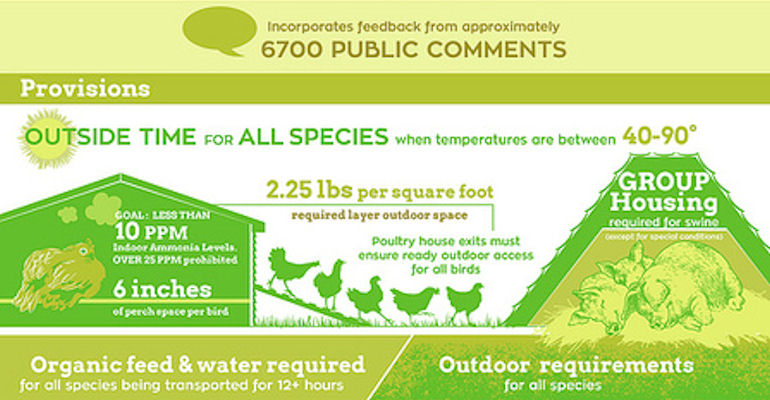AMS delays organic livestock standards final rule
Organic Trade Assn. urges USDA to avoid further delays of rule, while livestock groups want to see it shelved.

The U.S. Department of Agriculture’s Agricultural Marketing Service (AMS) is delaying the effective date of the Organic Livestock & Poultry Practices (OLPP) final rule by 60 days until May 19, 2017.
These actions are being taken in accordance with guidance issued Jan. 20, 2017, to ensure that the new Administration's policy team has an opportunity to review the rules. This is similar to procedures issued by previous administrations when entering office.
The Organic Trade Assn. (OTA) said it understands the idea of hitting the pause button to enable a review but urged USDA to avoid further delays and to allow the new effective date to stand as published.
In a statement, OTA said, “This final rule has received strong support throughout the organic chain, from organic producers to the organic consumer. The vast majority of organic livestock and poultry operations, including egg producers both large and small, and most major organic brands fully support these organic standards and view them as essential. Consumers trust that the organic seal represents a meaningful differentiation from other agricultural practices and fully support these standards.”
OTA added that the rule has been fully vetted and has gone through both the public comment process and scrutiny of federal budget watchdogs. “The rule reflects more than a decade of public engagement and input through the organic industry’s deliberative standard setting process that has now spanned five administrations of both parties,” OTA said.
Meanwhile, the United Egg Producers, National Pork Producers Council and National Cattlemen’s Beef Assn. had called for the new Administration to roll back the rule.
Regarding the White House’s executive order requiring federal agencies to cut two existing regulations for every new one proposed, the OLPP final rule is “not a new regulation,” according to OTA’s interpretation; it is a clarification to the existing regulations contained in Title 7 (Subtitle B, Chapter 1, Subchapter M, Part 205) of the Code of Federal Regulations that codify organic production and handling standards.
Maggie McNeil, OTA director of media relations, said the final rule clarifies two major issues:
1. Current organic standards require that organic livestock and poultry have access to the outdoors, and OLPP provides clarification as to what "outdoors" means.
2. Current organic standards require livestock and poultry housing to provide adequate space for freedom of movement and natural behaviors, and OLPP provides species-specific space requirements to accomplish this outcome consistently.
About the Author(s)
You May Also Like





